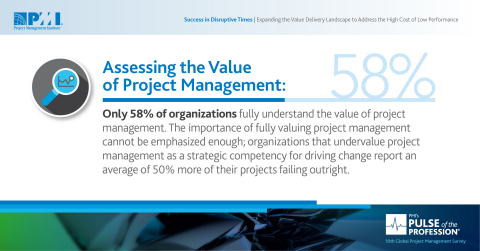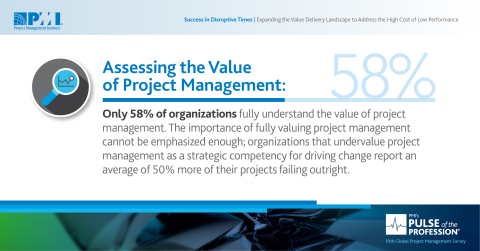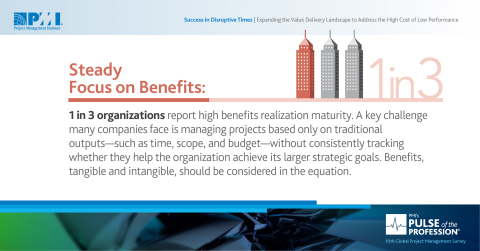PHILADELPHIA--(BUSINESS WIRE)--The 2018 Pulse of the Profession®, a global survey conducted by Project Management Institute (PMI), reveals around $1 million is wasted every 20 seconds collectively by organizations around the globe due to the ineffective implementation of business strategy through poor project management practices. This equates to roughly $2 trillion dollars wasted a year.
The study shows that on average organizations waste 9.9 percent of every dollar* due to poor project performance, and that around one in three projects (31 percent) do not meet their goals, 43 percent are not completed within budget, and nearly half (48 percent) are not completed on time. Alarmingly, executive leaders may be out of touch with this reality, as 85 percent surveyed said they believe their organizations are effective in delivering projects to achieve strategic results. These factors are leading to colossal financial losses for businesses around the world, with a significant broader macro-economic impact.
“Project management is the driver of strategy, but organizations are failing to bridge the gap between strategy design and its delivery,” said Mark A. Langley, President and Chief Executive Officer, Project Management Institute. “Effective project management to implement an organizations’ business strategy is key, and has a significant impact on the bottom line.”
Of the geographic regions included in the survey, China reported the lowest average monetary waste on projects (7.6 percent or $76 million per $1 billion), followed by Canada (7.7 percent or $77 million per $1 billion), and India (8.1 percent or $81 million per $1 billion). Contrarily, Australia reported the highest average waste on project spending at 13.9 percent or $139 million per $1 billion. *Figures are U.S. dollar amounts, but represent a percentage that applies to any currency.
“There is a powerful connection between effective project management and financial performance,” continued Langley. “Organizations that are ineffective with project management waste 21 times more money than those with the highest performing project management capabilities. But the good news is that by leveraging some proven practices, there is huge potential for organizations to course correct and enhance financial performance.”
In an era of increased financial scrutiny, shifting competitive pressures, and business disruption from evolving technology, the survey results point to five critical factors that can help organizations drive performance through more effective implementation of strategy.
1. Executive Sponsor Engagement is the Top Driver of Effective Strategy Delivery
The top driver of projects meeting their original business goals is an actively engaged executive champion or sponsor. But at the same time, organizations report an average of 38 percent of projects not having active executive sponsorship, which points to the need and opportunity for executive leaders to be more engaged in the delivery of strategy.
2. Greater Connection Between Strategy Design and Delivery
Executives often fail to recognize that effective project and program management is what delivers on strategy. More than one in three organizations (35 percent) report not having strong alignment of initiatives and projects that directly deliver against strategy. This indicates the need for C-Suite executives to better recognize the full potential of project management to execute strategy, and to ensure they are leveraging the right programs to directly deliver against strategy.
3. Optimize Investment in Strategy Implementation
Organizations often prioritize investment in developing strategy over proper execution. There appears to be a big disconnect between executive leaders and project managers on strategy implementation funding. While 84 percent of executive leaders believe they are effectively prioritizing and funding the right initiatives and projects, only 55 percent of Project Management Office (PMO) leaders agree. This suggests that organizations might not be leveraging the optimum focus and investment to deliver against strategy.
4. Leverage Disruption – Don’t Just React to It – Get Agile
In a world with an accelerated pace of innovation, disruption is the new normal. So, it’s not surprising that 83 percent of project managers report digital transformation has either moderately or dramatically impacted their work over the past five years. What’s key to success in today’s business environment is leveraging an agile approach with project management and delivering against strategy through ongoing evaluation of shifting market dynamics, new technologies and innovation.
But while 71 percent of organizations report greater agility over the last five years, only 28 percent report having high organizational agility overall. Though agility is increasing, the pace of change is inconsistent. In fact, from a broader organizational perspective, only 40 percent of organizations report prioritizing the creation of a culture receptive to change.
Looking forward, organizations that can leverage disruption and remain agile can drive both financial gain and competitive advantage.
5. Define and Track Success Metrics
The survey showed that on average, around half (52 percent) of projects experience scope creep and roughly half (48 percent) are not delivered on time, leading to huge financial losses. Defining success measures upfront helps ensure projects stay on track, and meet budgets and goals.
The extent to which organizations within different regions are leveraging these project management best practices is reflected in the overall wastage, detailed below from the least to most wastage:
| $ wastage, least to most | Region | Amount wasted due to poor project performance* | ||||
| 1 | China | 7.6% or $76M per $1B | ||||
| 2 | Canada | 7.7% or $77M per $1B | ||||
| 3 | India | 8.1% or $81M per $1B | ||||
| 4 | Middle East | 8.5% or $85M per $1B | ||||
| 5 | Asia Pacific | 8.6% or $86M per $1B | ||||
| 6 | Latin America | 10.2% or $102M per $1B | ||||
| 6 | U.S. | 10.2% or $102M per $1B | ||||
| 7 | U.K. | 10.8% or $108M per $1B | ||||
| 8 | EMEA (Europe, Middle East and Africa) | 11.7% or $117M per $1B | ||||
| 9 | Brazil | 12.2% or $122M per $1B | ||||
| 10 | Europe | 12.7% or $127M per $1B | ||||
| 11 | Australia | 13.9% or $139M per $1B |
*Figures are U.S. dollar amounts, but represent a percentage that applies to any currency.
About the PMI Pulse of the Profession® Survey
The Pulse of the Profession Survey® was conducted online in October 2017. The report highlights feedback and insights from 4,455 project management professionals, 800 Project Management Office (PMO) directors, and 447 executive leaders from a range of industries, including information technology, financial services, manufacturing, government, energy, healthcare, construction, and telecom around the globe.
About Project Management Institute (PMI)
Project Management Institute (PMI) is the world's leading association for those who consider project, program or portfolio management their profession. Founded in 1969, PMI delivers value for more than three million professionals working in nearly every country in the world through global advocacy, collaboration, education and research. We advance careers, improve organizational success and further mature the project management profession through globally-recognized standards, certifications, communities, resources, tools, academic research, publications, professional development courses and networking opportunities. As part of the PMI family, ProjectManagement.com creates online global communities that deliver more resources, better tools, larger networks and broader perspectives. Visit us at www.PMI.org, www.projectmanagement.com, www.facebook.com/PMInstitute and on Twitter @PMInstitute.
The full Pulse of the Profession Survey® can be viewed at www.pmi.org/Pulse.






